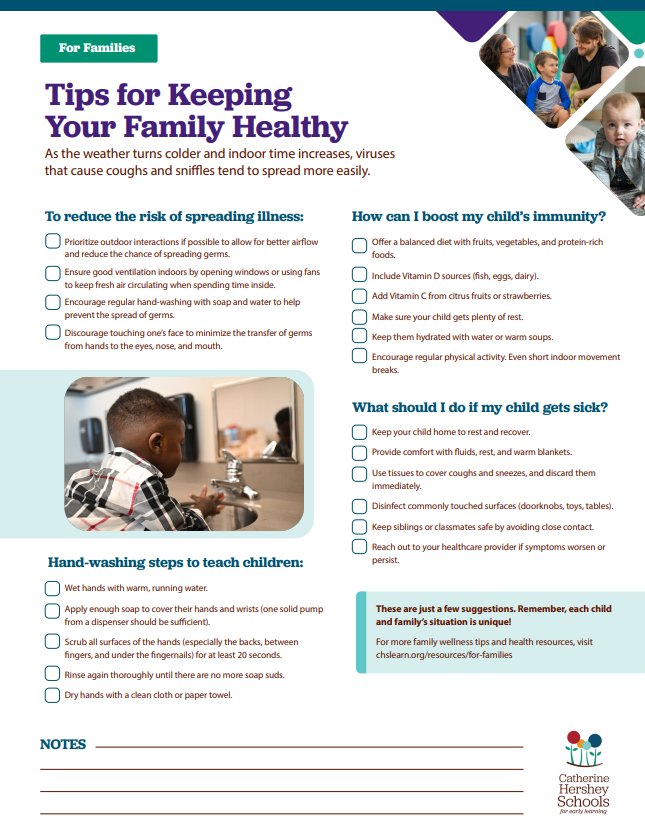Sniffle Season is Here: Tips for Keeping Your Family Healthy
As cold and flu season settles in, keeping your family healthy becomes more important than ever. From teaching proper handwashing to boosting your child’s immune system, small daily habits can make a big difference. Here are simple, practical tips inspired by Penn State Health’s Medical Minute to help your family stay healthy and happy all winter long.

As the days start to get colder and we get deeper into cold and flu season, it is inevitable that your child may come home with coughs and sniffles. Viruses survive for longer in colder weather and spread more easily indoors, which increases the risk of contracting an illness. Penn State Health offers a great resource for families in this Medical Minute article detailing 10 health tips during cold and flu season. Here are some easy steps you can take to help keep your family safe and healthy.
Prioritize Outdoor Play
One of the easiest ways for illnesses to spread is between class or playmates, as children spend less time outside in the fresh air. Once one child catches something, it can be passed around quickly through coughing or sneezing, or through sharing items such as toys or classroom materials.
There are several ways to reduce the risk of spreading. First, prioritize outdoor social activities if weather permits, or try to ensure that there is good ventilation in indoor spaces.
Wash Hands Regularly
However, the best way for your child to stay safe at an early learning center or school is by washing their hands regularly and avoiding touching their face too much during cold and flu season – we know, that’s no easy feat! Explain to your child that washing your hands helps to keep them healthy. It might take time to build the habit, so don’t give up!
You can teach your child how to wash their hands properly using the following steps:
- Wet hands with warm, running water.
- Apply enough soap to cover their hands and wrists (one solid pump from a dispenser should be sufficient).
- Scrub all surfaces of the hands (especially the backs, between fingers, and under the fingernails) for at least 20 seconds – encourage them to count out loud or sing a verse of a nursery rhyme or “Happy Birthday”!
- Rinse again thoroughly until there are no more soap suds.
- Dry hands with a clean cloth or paper towel.
Boost Immunity
You can reduce the risk of infection by ensuring your child’s diet contains essential vitamins and minerals necessary to boost their immune system. Generally, healthy foods are better than vitamin supplements. Fish, eggs, red meat, or dairy products all contain Vitamin D, which is essential given the lower sunlight levels during winter. Additionally, Vitamin C helps boost immunity and is most easily found in fresh citrus fruits such as oranges and lemons, or in strawberries. Vitamin A, Zinc, and Iron are also very important.
If Your Child Gets Sick
If you or your child does become unwell during cold and flu season, there are also easy steps you can take to improve their comfort and prevent passing it on to others. It’s important to remember that winter illnesses and colds are normal and help to build long-term immunity. It is a good idea to keep your child at home, so they have a safe and cozy place to recover without spreading illnesses to others.
Teach your child to cough or sneeze into a tissue rather than their hands to reduce the risk of onwards transmission. If you start teaching them good habits, they are more likely to have a healthy and happy winter, which also means less stress (and illness) for you.





